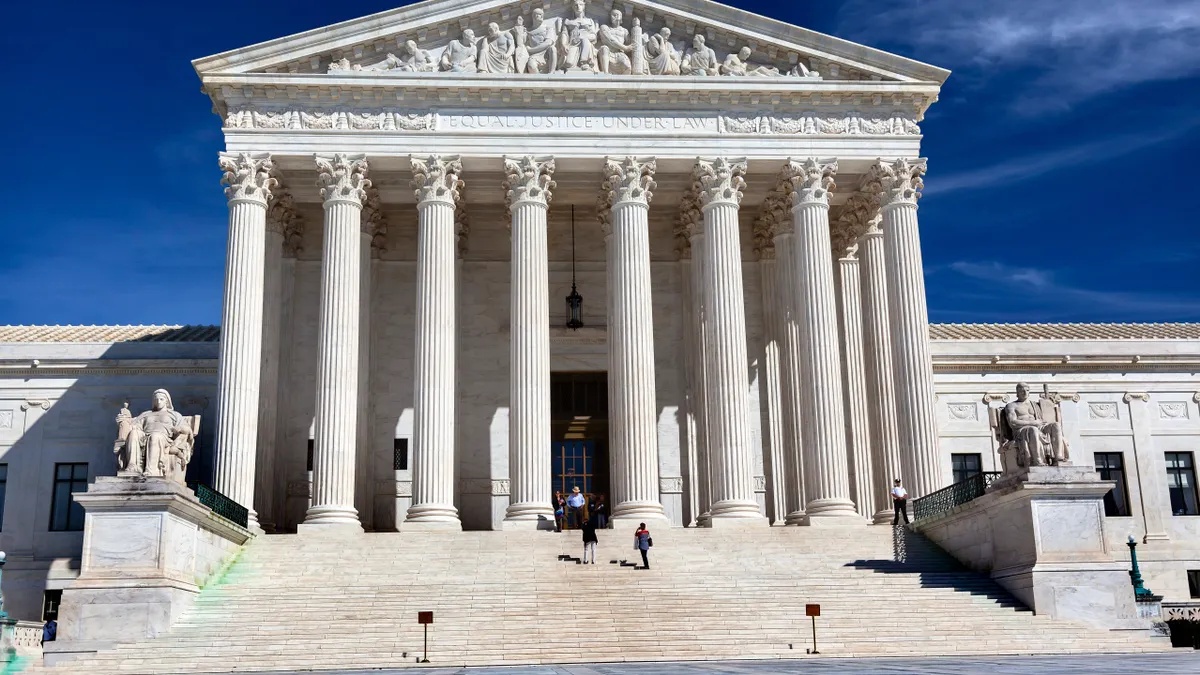Dive Brief:
- A court may not authorize class-wide arbitration on the basis of an ambiguous agreement between parties to a lawsuit — including those between an employee and employer — the U.S. Supreme Court ruled in a 5-4 decision Wednesday (Lamps Plus, Inc. v. Varela, No. 17-988 (April 24, 2019)).
- The case involved an employee of manufacturer Lamps Plus, Frank Varela, who brought a putative class action lawsuit on behalf of himself and other employees whose tax information was compromised in a data leak affecting Lamps Plus. A district court dismissed Varela's claims and granted Lamps Plus’ subsequent motion to compel arbitration in the matter, but the court rejected the company’s request for individual arbitration, instead authorizing class-wide arbitration. The 9th U.S. Circuit Court of Appeals affirmed, ruling Varela's arbitration agreement with Lamps Plus "include[d] no express mention of class proceedings" and therefore differed from the Supreme Court’s precedent set in Stolt-Nielsen v. Animalfeeds International Corp.
- But the High Court overturned the 9th Circuit's decision, which relied on a California state rule — contra proferentem — that ambiguity in a contract should be construed against the drafter of the contract. Chief Justice John Roberts, who wrote the majority's opinion, said the rule could not be applied to impose class arbitration in the absence of the parties' consent. The court’s ruling "is consistent with a long line of cases holding that the [Federal Arbitration Act] provides the default rule for resolving certain ambiguities in arbitration agreements," Roberts wrote.
Dive Insight:
The decision is a "big win" for employers, Robert Friedman, managing shareholder in the Dallas, Texas, office of Littler Mendelson, told HR Dive in an emailed statement. Friedman said the Supreme Court also repeated that class actions "are not well suited to arbitration and interfere with the fundamental attributes of arbitration — namely the speed, significance and lower costs of bilateral arbitration."
Court watchers were waiting for a decision in Lamps Plus following last year's landmark ruling in Epic Systems Corp. v. Lewis, in which the High Court upheld the rights of employers to require that employees arbitrate disputes individually. Lamps Plus has effectively created what could be an "insurmountable barrier" to arbitration on a class-wide basis, Bryan Keane, partner at Dorsey & Whitney, told HR Dive in an emailed statement, especially coupled with Stolt-Nielsen. If parties wish to consent to class arbitration, that consent should be included expressly in an agreement, Keane said.
Though it may provide certain benefits to both employers and employees in the event of a dispute, arbitration is not necessarily always the most efficient route for resolution, legal experts previously told HR Dive. The process can in some cases be more lengthy and costly for employers than the alternative. Mandatory or forced arbitration has also garnered backlash from employee advocates, especially within the context of sexual harassment and assault.
Keane noted the Supreme Court didn't address the question of whether the availability of class arbitration is a question of arbitrability to be decided by an arbitrator, though he said the court was asked to do so. "Certainly, a party should anticipate that arbitration claimants will continue to argue that the issue of class arbitration is a matter of arbitrability to be resolved by an arbitrator and not a court," Keane said. "Accordingly, it is important for parties to understand what their arbitration agreements and referenced or applicable arbitration rules provide with respect to questions of arbitrability (and to revise such agreements accordingly), if they desire to ensure the issue of class arbitration is not deemed one of arbitrability to be decided by the arbitrator."













